
Contrairement à l'imagination illimitée qui nous est laissée par les champignons de reishi cueillets de l'immortel, La représentation des anciens peintres sur la sélection des champignons de reishi était très pragmatique et réaliste.
Prendre Lingzhi dans les montagnes profondes - trop profonde pour localiser
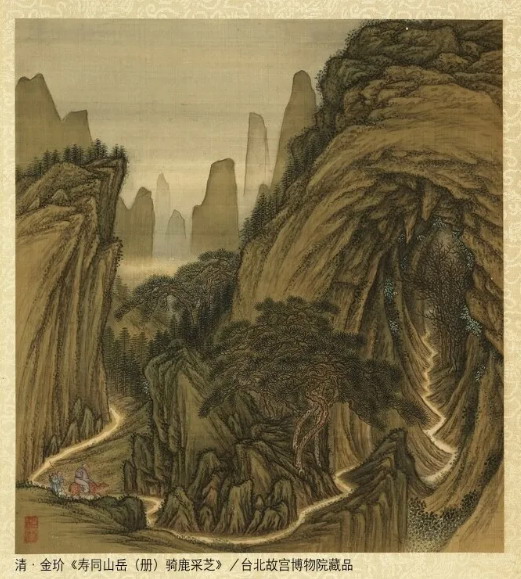
La onzième œuvre d'art sur le thème de "Riding a Deer et de la cueillette de Lingzhi" dans l'album de "Live As The Mountain" du peintre de la cour Jie Jie pendant la période de Yongzheng de la dynastie Qing raconte les longues routes sinueuses dans le processus de sélection Lingzhi. Combien de temps le cueilleur prendra-t-il pour le trouver? Dieu seul le sait.
Les dates de retour inconnues testent les personnes dans les montagnes ainsi que celles à l'extérieur des montagnes. «Sous les pins de la dynastie Tang Jia Dao, j'ai demandé à un élève de votre endroit où, Qui a mentionné son maître est allé rassembler des herbes. Quelque part dans la montagne, tu étais à coup sûr, Incertain était là où vous étiez parmi la couverture nuageuse profonde. » Nous ne savons pas combien de fois il a été mis en scène dans la vraie vie. Mais pour prolonger la vie et vivre aussi longtemps que les montagnes, Il y a toujours un prix à payer, droite?
Choisir Lingzhi dans les forêts froides · d'innombrables épreuves et épreuves
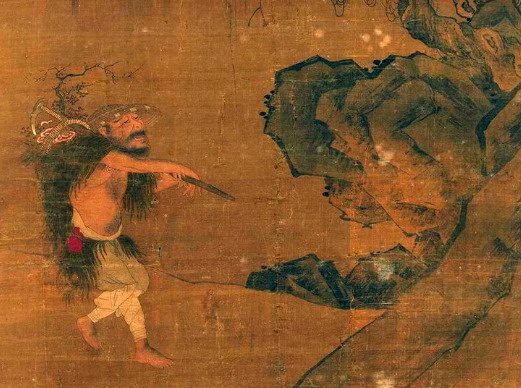
Le peintre Li Cheng, qui était actif des cinq dynasties au début de la dynastie du Northern Song, avait le statut de maître dans le cercle de peinture de paysage chinois, Et il était doué pour peindre les forêts froides en hiver sévère du nord. Dans l'une des «photos de la forêt froide», Il a dessiné une personne qui a choisi le Ganoderma Lucidum. Le Ganoderma Lucidum dans le panier en bambou était frais et dégoulinant, Faire des gens oublier presque que la «croissance à l'époque de Qingming et mûrit après le Dragon Boat Festival» est la nature de Ganoderma Lucidum.
Apparemment contraire au bon sens naturel, C'est en fait la conception artistique de l'auteur à travers le paysage:
Si la forêt froide symbolise la vieillesse, Puis Ganoderma Lucidum, qui est toujours vivant quand tout est vieux, est sans aucun doute une promesse à ceux qui mangent depuis longtemps;
Si la forêt froide est une métaphore d'une situation difficile, C'est évidemment un hommage aux personnes qui grimpent sur les montagnes pour trouver quelques ganoderma lucidum dodus.
Choisir Lingzhi dans la Snow Mountain · Risk Lives
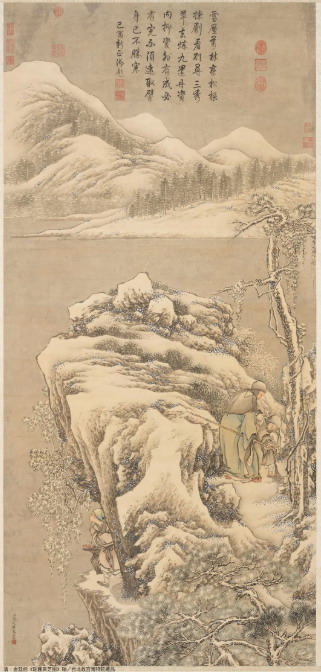
Si la sélection des champignons Reisi dans la forêt froide n'est pas assez difficile, Regardez ce «Picking Lingzhi in the Yaopu» achevé par le peintre de la cour de Qing Jin Tingbiao dans la cinquante-quatrième année de l'empereur Qianlong. Marcher sur la glace mince pour collecter Ganoderma lucidum est une performance désespérée - bien que Ganoderma lucidum ait été collecté, Les os du cueilleur étaient également gelés, Et on ne savait pas si le sélecteur pouvait descendre en toute sécurité.
Il s'agit également d'une peinture de paysage qui emprunte des paysages pour exprimer des émotions, Mais ce que l'auteur veut transmettre a dépassé la difficulté de choisir Lingzhi. L'auteur a eu la pitié des gens qui choisissent Lingzhi et ont interrogé «à la recherche de l'herbe de Sanxiu à tout prix pour affiner la pilule de Jiuzhuan»:
L'herbe immortelle qui peut prolonger la vie met la vie du cueilleur en danger. N'est-ce pas une pratique de s'occuper des bagatelles et de négliger l'essentiel?
Quelle est la signification de la soi-disant poursuite de l'immortalité que si vous ne savez comment chercher la pilule mais oubliez la pratique du cœur?
Choisir Lingzhi dans la forêt de pin pour le maître
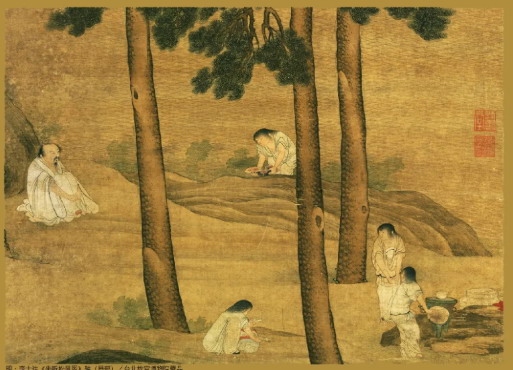
Ou peut-être que ce n'est pas difficile de choisir des champignons reishi, Mais il est difficile d'avoir l'occasion de manger des champignons reishi, parce que, dans les temps anciens, L'identité détermine tout. Tout comme cette «photo de s'asseoir et d'écouter le pin» réalisé par Li Shida, un Jinshi dans la dynastie Ming, Prendre et manger du lingzhi est évidemment deux sort différents.
Lingzhi accordé par le ciel · à l'empereur
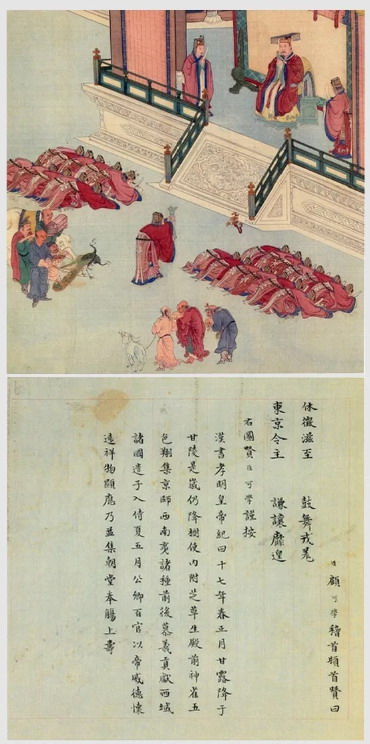
Ou, Si vous n'avez même pas besoin de chercher Ganoderma Lucidum, La gentillesse d'un empereur induit naturellement la croissance de Lingzhi. C'est juste que bien que le Ganoderma Lucidum à droite aux pieds de l'empereur soit proche, qui ose y penser? Au mieux, Cela ne peut être que des centaines de responsables civils et militaires dans le «empereur XiaoMing de la dynastie Han» du peintre de Ming Dynasty., A agenouillé devant le fondateur de la dynastie Ming, Criant «Vive l'empereur».
Lingzhi efficace · heureux comme un immortel
Bien qu'il ne soit pas facile de cueillir et de manger Lingzhi, Il peut être vu à partir de cette photo anthropomorphe «l'image céleste» de Leng Qian, un prêtre taoïste dans la dynastie Ming, que les anciens étaient encore optimistes dans leur mentalité et ont hâte de vivre comme les dieux dans les peintures en mangeant du ganoderma dans la vie quotidienne, longévité et immortalité.
Plantation artificielle de lingzhi · à portée de main
Contrairement aux temps anciens où un lingzhi est difficile à trouver, avec l'avancement de la technologie de culture artificielle moderne, Ganoderma Lucidum est devenu facilement disponible.
Mais ce qui est intéressant, c'est que, par rapport à l'ancienne croyance ferme que Ganoderma Lucidum est une chose très rare et précieuse partout dans le monde, De nombreux gens modernes peuvent même ne pas regarder Ganoderma Lucidum même s'il est placé devant eux.
Il s'avère que la distance la plus éloignée n'a rien à voir avec le voyage et l'identité mais la distance de l'esprit; Quand l'esprit cesse de croire, Peu importe à quel point la panacée est efficace, il ne peut être manqué que pour toujours.
Les avantages de Ganoderma Lucidum peuvent toujours être ressentis après la consommation à long terme.
Lorsque nous n'avons pas besoin de risquer nos vies ou de grimper sur les montagnes pour trouver un Lingzhi, Lors de la consommation de Lingzhi, peut être partagé également quelle que soit l'identité, Pourquoi ne jetez pas un œil à Lingzhi que les anciens aspiraient dans leurs rêves? Pourquoi ne prenez-vous pas le temps de ressentir les avantages de Ganoderma lucidum qui a été élogieux depuis des milliers d'années?
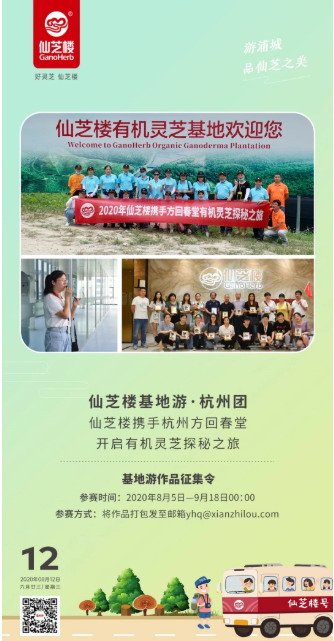
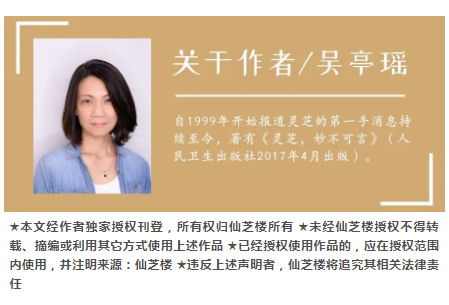
★ Cet article est publié sous l'autorisation exclusive de l'auteur, et la propriété appartient à GanoHerb
★ Les œuvres ci-dessus ne peuvent pas être reproduites, extrait ou utilisé d'une autre manière sans l'autorisation de GanoHerb
★ Si l'utilisation des œuvres a été autorisée, ils doivent être utilisés dans le cadre de l'autorisation et indiquer la source: GanoHerbe
★ Violation de la déclaration ci-dessus, GanoHerb poursuivra ses responsabilités juridiques connexes
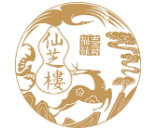
Transmettez la culture de santé millénaire
Contribuer au bien-être pour tous



